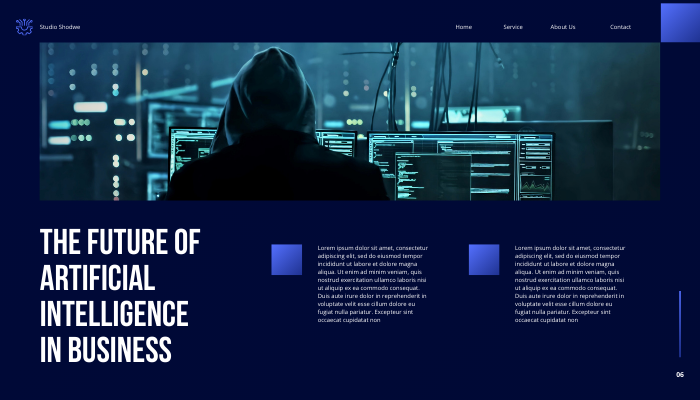Overview
In the business sector, artificial intelligence (AI) is revolutionizing how organizations function, compete, and expand. AI has the ability to completely transform a number of industries, and this is becoming more and more clear as it develops. Artificial Intelligence has a wide range of applications in business, from automating repetitive jobs to improving decision-making procedures. This article examines AI’s prospects in business, including its advantages, disadvantages, and ability to drastically alter the corporate environment.
The Situation of AI in Business Right Now
AI is already included into a lot of business processes nowadays. Businesses across all sectors utilize AI-powered tools and algorithms to make data-driven choices, optimize workflows, and enhance consumer experiences. The speed and accuracy with which AI can evaluate huge datasets has made it.
Automation of Routine Tasks: The Future of AI in Business
The automation of repetitive work is one of the most important ways artificial intelligence (AI) will affect business in the next years. Automation is best suited for repetitive, labor-intensive, and human error-prone tasks. This covers basic customer service interactions, scheduling, data entry, and even some decision-making.
Businesses will be able to run more effectively and with less resources as AI-powered automation solutions become more sophisticated. Companies will be able to concentrate on more strategic tasks that call for human ingenuity and critical thinking, which will eventually spur innovation and growth.
Improving Decision-Making
AI will completely change how businesses make decisions because of its capacity to analyze enormous volumes of data and deliver insights instantly.
Customized Experiences for Customers
AI will be essential to the development of highly customized consumer experiences. AI can comprehend unique preferences, habits, and demands by examining consumer data. This enhances client happiness and loyalty by enabling firms to customize their offerings in terms of goods, services, and marketing.
AI-powered personalization will eventually go beyond marketing. Businesses will be able to provide personalized goods, services, and assistance, resulting in a more interesting and fulfilling consumer experience. Maintaining this degree of customization will be essential to being competitive in a crowded market.
AI-Driven Creativity
AI will be the engine of corporate innovation. Artificial Intelligence (AI) will free up human resources to focus on creative problem-solving and the development of new products by automating repetitive jobs and offering insightful data.
AI Ethics and Appropriate Application
Ethical issues will surface as AI gets more and more integrated into corporate processes. AI decision-making raises questions about accountability, transparency, and prejudice, especially when it comes to hiring, financing, and law enforcement.
Businesses will have to create and put into place moral AI frameworks that guarantee responsibility, transparency, and fairness in the future. This entails implementing bias-free AI systems, offering justifications for judgments made using AI, and making sure that AI is applied in a way that complies with the law and societal norms.
AI in the Labor Market
There is a lot of discussion about how AI will affect the labor force. AI may replace certain workers, but it will also open up new career prospects.
Obstacles and Things to Think About
Although AI has a bright future in business, there are a number of obstacles that need to be overcome before businesses can fully take use of this technology.
Security and Privacy of Data
Since AI depends so much on data, it is critical to protect the security and privacy of that data. To stop breaches and misuse, businesses need to have strong data protection safeguards in place. They also have to negotiate the complicated regulatory environment that surrounds data privacy, especially in areas with strict data protection regulations.
Combining with Current Systems
The process of incorporating AI into current business processes can be difficult and expensive. Businesses need to make sure AI solutions work with the infrastructure they already have and that they have the technical know-how to handle and maintain these systems.
Adherence to Regulations
The regulatory environment will change as AI advances. Companies need to make sure their AI operations are compliant and keep up with any new legislation. This entails abiding by laws pertaining to data protection, consumer rights, and AI ethics in addition to restrictions that are industry-specific.
In summary
Artificial intelligence has a bright and difficult future in business. Artificial Intelligence (AI) has the power to revolutionize every facet of business, from automating repetitive work to spurring creativity and improving decision-making. Businesses must overcome a number of obstacles to realize this potential, though, including data protection, AI bias, and legal compliance.
Businesses who see AI’s potential and take steps to overcome its obstacles will be well-positioned to prosper in the fiercely competitive global economy as AI develops. Businesses may use AI to boost productivity, drive growth, and provide more individualized and interesting consumer experiences by investing in the technology, encouraging innovation, and placing a high value on ethical issues.
To sum up, artificial intelligence (AI) is not merely a tool for the future; it is business’s future. Businesses that successfully incorporate AI into their operations will open up new avenues for growth and opportunity, reshaping the business landscape in ways that are currently unimaginable.
